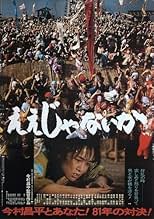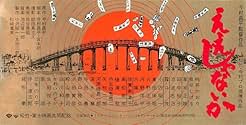AVALIAÇÃO DA IMDb
6,8/10
718
SUA AVALIAÇÃO
Adicionar um enredo no seu idiomaNear the turbulent end of the Edo era, a man returning to Japan after exile in America searches for his wife and becomes swept up in the current of revolution in this incisive period drama f... Ler tudoNear the turbulent end of the Edo era, a man returning to Japan after exile in America searches for his wife and becomes swept up in the current of revolution in this incisive period drama from the great Shohei Imamura.Near the turbulent end of the Edo era, a man returning to Japan after exile in America searches for his wife and becomes swept up in the current of revolution in this incisive period drama from the great Shohei Imamura.
- Direção
- Roteiristas
- Artistas
- Prêmios
- 6 vitórias e 7 indicações no total
- Direção
- Roteiristas
- Elenco e equipe completos
- Produção, bilheteria e muito mais no IMDbPro
Avaliações em destaque
Shigeru Izumiya returns from shipwreck and a sojourn in America to Japan in the chaos of the Meiji Restoration. He escapes from prison, searches out his wife, Kaori Momoi, who had been sold by her parents to the perpetual carnival outside of Tokyo. They struggle to reconnect, and eventually gain a tentative foothold, only to see it vanish in the last thrashings of the Shogunate.
Shôhei Imamura had taken a decade off from narrative movies to direct documentaries. He had returned to fiction in 1979, but his focus was still on the underclass, and the chaos they live amidst. As his leads struggle and fall, and cease to care, Imamura's focus is on their futile efforts to find some happiness, and the uncaring brutality of their rulers. It's a long journey from Kurosawa's noble samurai and traditional Japanese insistence on dedication to the nation to this frequently shocking movie, but the director's focus and viewpoint are compelling.
Shôhei Imamura had taken a decade off from narrative movies to direct documentaries. He had returned to fiction in 1979, but his focus was still on the underclass, and the chaos they live amidst. As his leads struggle and fall, and cease to care, Imamura's focus is on their futile efforts to find some happiness, and the uncaring brutality of their rulers. It's a long journey from Kurosawa's noble samurai and traditional Japanese insistence on dedication to the nation to this frequently shocking movie, but the director's focus and viewpoint are compelling.
With its shattered scattered narrative, gritty visual and witty music, EIJANAIKA seems to give the truer picture of a time in Japanese history than any typical period picture with standard parameters would have. However, to get this impression of this two-and-a-half hour long film, one needs patience, interest in Imamura's work (It helps if one has seen and liked either Eeel, Vengeance, Narayama, or all of them) and liking for Japanese cinema. The start is very gripping. And its chaotic, musical, darkly funny finale remains one of the more memorable scenes involving mayhem one would encounter in a film from any timezone. It reminded me of the angry-crowd-flying-into-the-air end sequence of Vittorio De Sica's "Miracle In Milan". Overall it's fun to watch Imamura and his crew ("Stop, you funny Showmen! Or I'll Shoot" the ensemble is threatened)lending a musical ear to history.
Shohei Imamura's "Eijanaika" is an awesome film -- much better than I expected. This is a film painted on a much bigger canvas than Imamura's norm -- it's rather reminiscent of Dickens's "Barnaby Rudge", albeit with humor, nudity and sex. It is set in the turbulent last days of the Shogunate, and has a large number of characters one must try to keep track of -- something I didn't find that hard to do. Whatever it lacks in "subtlety", it makes up for in exuberance.
It's 1866. Genji returns to Japan after six years in America. He's told that his wife had been sold. It's the turbulent end of the Edo era but filmmaker Shôhei Imamura follows the lowly common man.
I am interested in Genji and Ine. I like this lower class Japan. It's not something that I've seen before. The story is somewhat chaotic. There is a lot going on. I would like to have less. I do like the crass ugliness and its beauty. This has good energy.
I am interested in Genji and Ine. I like this lower class Japan. It's not something that I've seen before. The story is somewhat chaotic. There is a lot going on. I would like to have less. I do like the crass ugliness and its beauty. This has good energy.
TCM's Alicia Malone described this Shohei Imamura film as, among other things, "grotesque" and "messy". To that I would add too long and confusing. At no point could I fully understand what was going on in 1860s Japan as portrayed in this film. Were the peasants betrayed by both their own leaders as well as the Shogunate? Why was the film's hero imprisoned at the start of the film and how did he gain his release? Was it just me or was there a scene where Ine is found drowned only for her to appear later on? I'm sure that if I were to have grown up in Japan these things would have been clearer to me but I didn't and they weren't. Add a plethora of rather dull subsidiary gangster characters and Imamura's annoying habit of taking us away from the interesting central conflict that is the dysfunctional Ine/Genji marriage to dwell on these vacuous, amoral folks, for whom we care not one jot or tittle, and you can understand why I pulled the plug about ninety minutes in and would have done so sooner were it not for the respect I have for the director of "Insect Woman". C plus.
Você sabia?
- ConexõesFeatured in The Pacific Century: The Meiji Revolution (1992)
Principais escolhas
Faça login para avaliar e ver a lista de recomendações personalizadas
Detalhes
Contribua para esta página
Sugerir uma alteração ou adicionar conteúdo ausente
























